Select Language

By David Milliken and Suban Abdulla
LONDON (Reuters) - British inflation returned to its 2% target in May for the first time in nearly three years, official figures showed on Wednesday, as the economic effect of the COVID-19 pandemic and Russia's full-scale invasion of Ukraine faded.
The fall in inflation will be welcomed by both Prime Minister Rishi Sunak and the Bank of England - but likely has come too late either to turn around Sunak's fortunes at next month's election or to prompt a BoE rate cut on Thursday.
The drop in annual consumer price inflation from April's 2.3% reading was in line with economists' median expectation in a Reuters poll and marks a sharp decline from the 41-year high of 11.1% reached in October 2022.
The fall has been sharper than in the euro zone or the United States, where consumer price inflation in May was 2.6% and 3.3% respectively, belying concerns a year ago that British inflation was proving unusually sticky.
Even so, consumer prices are up around 20% over the past three years, squeezing living standards and contributing to the unpopularity of Sunak's Conservatives, who are around 20 points behind the opposition Labour Party in opinion polls.
The BoE has said a return of inflation to its target is not enough on its own for it to start cutting interest rates.
While most economists polled by Reuters think it will start to cut interest rates from its 16-year high of 5.25% in August, financial markets think a first move is more likely in September or October - and see just a 10% chance of a cut this week.
The most recent fall in inflation was driven by a cut in regulated household energy bills in April - the effect of which will fade later in the year, when the BoE forecasts inflation will rise again.
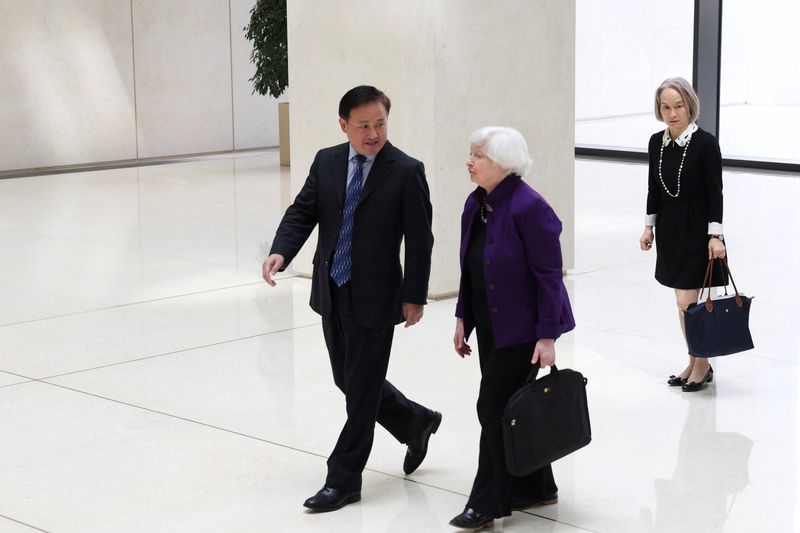
SHANGHAI (Reuters) - China will stick to a supportive monetary policy stance, while conditions for the central bank to start trading in the secondary bond market has become gradually ripe, the head of its central bank said on Wednesday.
China will flexibly use various monetary policy tools including interest rates and reserve requirement ratios, People's Bank of China (PBOC) Governor Pan Gongsheng told the Lujiazui Forum in Shanghai.
He added that China will resolutely prevent exchange rate overshooting.
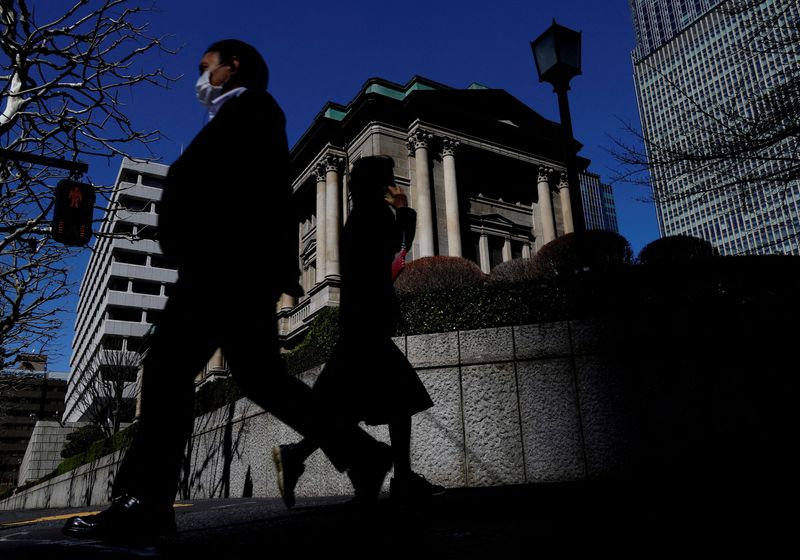
By Leika Kihara
TOKYO (Reuters) -Bank of Japan policymakers debated the impact a weak yen could have on prices, with some flagging the chance of raising interest rates sooner than expected if inflation overshoots, minutes of the central bank's April policy meeting showed.
A few members of the nine-person board said the central bank must respond with monetary policy if exchange rate moves, which are among the key factors affecting the economy and prices, alter its view on the outlook and risks, the minutes released on Wednesday showed.
The weak-yen boost to inflation may have become bigger and more lasting than in the past, as companies are already keen to hike prices and wages, some members were quoted as saying.
"There are various upside risks to inflation," such as the fallout from a weak yen, expansionary fiscal policy and a tight labour market, one member said, according to the minutes.
"Currency moves are among key factors affecting the economy and prices. If the economic and price outlook, or the risks, change, the BOJ must respond with monetary policy," a few members were quoted as saying in the minutes.
At the April meeting, the BOJ kept interest rates around zero and highlighted a growing conviction that inflation was on track to durably hit its 2% target in coming years, signalling its readiness to hike borrowing costs later this year.
The minutes came in the wake of BOJ Governor Kazuo Ueda's comments in parliament on Tuesday that the central bank could raise interest rates in July depending on economic and price data available at the time.
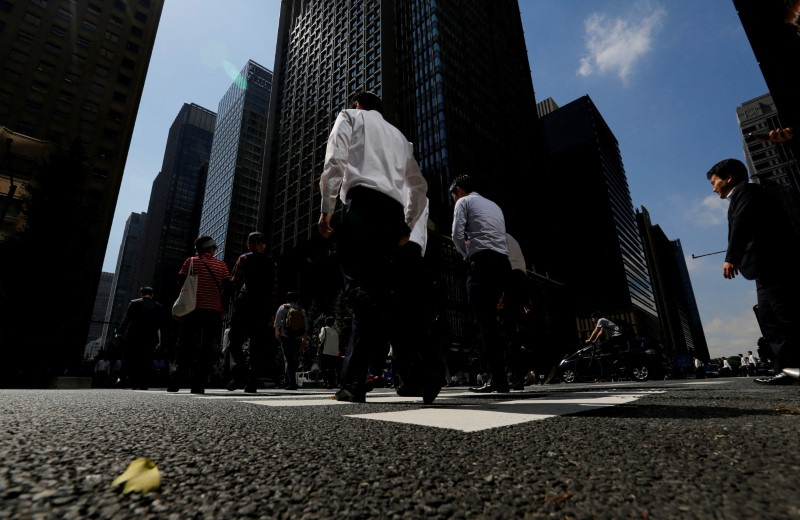
By Tetsushi Kajimoto
TOKYO (Reuters) - Japanese manufacturers are markedly less confident about business than three months ago due to higher materials costs, the Reuters Tankan poll for June showed, though the index remained in positive territory for a fourth straight month.
The results of the monthly poll - a leading indicator for the Bank of Japan's (BOJ) closely watched tankan quarterly business survey - underscore the uneven nature of the country's economic recovery. The next BOJ tankan will be released on July 1.
The manufacturers' sentiment index declined to +6 from +10 three months ago and from +9 in May, with firms hurt by a yen that is trading near 34-year lows and inflating costs of raw materials that resource-poor Japan needs to import from abroad.
"Passing on materials costs to customers and the increase in labour costs are sapping appetite for capital expenditure and other spending," a machinery maker manager wrote in the comment section of the poll.
Some manufacturers also expressed concerns about the knock-on effects of a scandal in the auto industry where Toyota (NYSE:TM), Mazda and others have acknowledged irregularities in vehicle certification tests.
"The business environment surrounding industrial machinery is clearly changing for the worse," wrote a manager in the auto sector. "It's unclear how the certification issue will affect our business."
That said, manufacturers overall were a bit more upbeat about the months ahead and the index is expected to rebound to +9 in September.
The non-manufacturers index climbed to a three-month high of +31 in June. That was up five points from May but one point lower than three months ago. It is expected to stay at +31 in September.
Expectations that rising wages and income tax cuts from June will help underpin consumer spending are likely shoring up business confidence in the service sector, economists have said.
The Reuters Tankan poll was conducted June 5-14. Some 500 large non-financial companies were surveyed on condition of anonymity and roughly 230 firms responded.
The indexes are calculated by subtracting the percentage of pessimistic respondents from optimistic ones. A negative figure means pessimists outnumber optimists.

MUMBAI (Reuters) - India is expected to grow by 7.2% in the current fiscal year, stronger than earlier expected, with its central bank opting for just a one-quarter-point rate cut in that period, Fitch Ratings said in its quarterly Global Economic Outlook (GEO) report published on Tuesday.
The ratings agency has also raised its world growth forecast for 2024 to 2.6% from 2.4% earlier as confidence in European recovery prospects improve, China's export sector revives and domestic demand in emerging markets excluding China shows stronger momentum.
"We still expect the RBI to cut its policy rate this year, but only once, to 6.25%. In the March GEO we expected 50 basis points of cuts this year. We then expect 25 bps of cuts in both 2025 and 2026," Fitch wrote.
India's growth forecast marks an upward revision of 0.2 percentage points versus their March forecast.
"Investment will continue to rise but more slowly than in recent quarters, while consumer spending will recover with elevated consumer confidence," Fitch said about India.
The agency, however, expects growth to slow in later years and approach their medium term trend estimate.
"We forecast real GDP growth of 6.5% in FY25/26 (unchanged from March), and 6.2% in FY26/27, driven by consumer spending and investment," they wrote.
Fitch expects headline inflation in the South Asian nation to continue declining to 4.5% by calendar year-end, and average 4.3% in 2025 and 2026, staying slightly above the mid-point of the Reserve Bank of India's 2% to 6% target range.

SEOUL (Reuters) - South Korea's central bank governor said on Tuesday the pace of consumer inflation is likely to continue to slow, feeding expectations the Bank of Korea will start cutting interest rates towards the end of this year.
"Considering the recent slowdown in international oil and agricultural product prices, future prices are expected to continue a gradual slowdown, in line with our May forecasts," Governor Rhee Chang-yong said in a statement prepared for the bank's biannual review of inflation conditions.
Inflationary pressure from domestic demand is likely to stay contained, while exports growth is expected to take the driver's seat in the economy seen growing 2.5% this year, he added.
Tuesday's assessment supports analysts consensus that the BOK will cut interest rates by 50 basis points in the fourth quarter as headline inflation is seen easing to its target rate of around 2% towards the end of this year or early next year.
The BOK extended its interest rate pause for an 11th straight meeting in May, keeping it restrictive after raising rates by a cumulative 300 basis points to 3.50% since mid-2021.
South Korea's headline inflation slowed for a second straight month to a 10-month low of 2.7% in May, while core inflation also eased to 2.2% from 2.3% in April.
The BOK also noted that although inflation is headed towards its target rate of 2%, the cost of living in Asia's fourth largest economy remains elevated compared to other major countries.
An index for the cost of food, shelter and clothes was at 155 for South Korea in 2023, above the average of 100 for countries in the Organisation for Economic Co-operation and Development, data compiled by BOK showed.

By Naveen Thukral
SINGAPORE (Reuters) -Pork suppliers from South America and the U.S. could gain market share in China if Beijing restricts imports from the European Union in response to escalating trade tensions, traders and analysts said.
Russia, increasingly a close trading partner of China that started exporting pork to China in February, could also step up meat shipments.
China's commerce ministry said on Monday it had opened an anti-dumping investigation into imported pork and its by-products from the EU, after the bloc imposed anti-subsidy duties on Chinese-made electric cars.
Any impact on EU exports will take time to emerge. China has said the investigation could last more than a year.
"Brazil, Argentina and the U.S. can export more pork and offal to China if exports from the European Union are restricted," Pan Chenjun, a senior analyst at Rabobank in Hong Kong, said.
"If the anti-dumping tax is too high, than shipments from other origins such as the US, Brazil and Argentina will increase."
The U.S. Meat Export Federation (USMEF) noted U.S. pork faces retaliatory duties of 25% in China in response to steel and aluminum tariffs, however.
"It is unclear whether U.S. pork will still be at a tariff disadvantage compared to EU pork, as is the case today," said Joe Schuele, vice president of communications for the USMEF.
Smithfield Foods, a unit of Hong Kong-listed WH Group (OTC:WHGLY) ltd, is familiar with the impact of Chinese tariffs on U.S. pork and would welcome relief on that front, spokesman Jim Monroe said.
Anti-dumping duties could hit Europe hard as China's pork purchases from Europe include parts such as feet, ears and offal that tend to only be used for pet food rather than human consumption in Europe.
Pan, however, said any impact on China's market would be limited.
"We don't see much impact on the local market in terms of supplies and prices if imports are restricted from the European Union. This is because China's imports of pork and offal are just 5% of total consumption," Pan said.
USMEF's Schuele said there could be further opportunities for U.S. pork variety meats in China, including feet, stomachs, heads and neckbones.
LEADING CONSUMER AND PRODUCER
In 2023, China imported $6 billion worth of pork, including offal, customs data showed.
It is the world's leading pig producer and consumes around half the world's pork.
Domestic hog prices had plummeted, but oversupply has eased this year as farmers slaughtered fewer pigs to boost the market.
One Asia-based trader who deals in animal feed said Brazil, China's leading agricultural trading partner, stood to gain from any EU trade disruption.
The trader, who asked not to be named because they were not authorised to speak to the press, said Brazil was very competitive in terms of pricing and would be able to easily increase market share.
Russia also has potential for growth, and according to Yuri Kovalev, head of the country's National Union of Pork Producers, it wants a 10% share of China's pork imports within three to four years.
As of June 2, Russia's pork shipments to China totalled 4,260 metric tons, but Sergey Dankvert, the head of Rosselkhoznadzor, Russian agricultural watchdog, said earlier this month Russia could export up to 100,000 tons of pork to China in 2024.
The head of Miratorg, one of Russia's major pork suppliers, Viktor Linnik told an investment forum in St. Petersburg that the agricultural holding was ready to supply China with about 40,000 tons of pork by the end of the year.
One meat trader in Shanghai, who asked not to be named, said his company was in contact with Russian pork exporters.
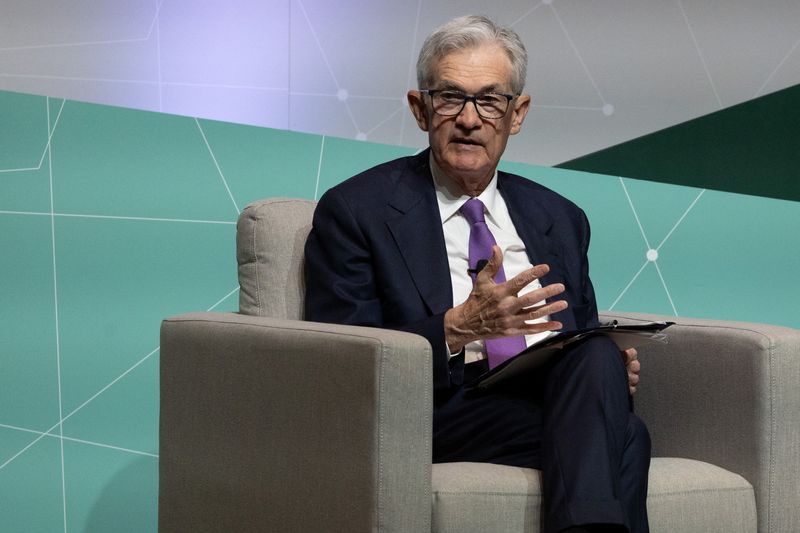
By Ann Saphir
(Reuters) -U.S. Federal Reserve Chair Jerome Powell is scheduled to give his semiannual testimony on monetary policy on July 9 at the Senate Banking Committee, the office of Senator Sherrod Brown, the committee's chair, said on Monday.
If scheduling proceeds as it has historically, Powell would deliver the same testimony at the House Financial Services committee the following day. Spokespeople for that committee did not immediately respond to a request for information.
Both hearings are typically hours-long affairs, with lawmakers from both sides of the aisle grilling Powell on a range of topics from interest-rate policy to the state of the banking system.
Powell was first appointed as Fed Chair by former president Donald Trump and reappointed for a second term by President Joe Biden. At all turns he seeks to assert the central bank's independence from politics, with any interest-rate decisions driven entirely by the state of the economy.
The Fed last week kept the policy rate in the 5.25%-5.5% range, and signaled it may cut borrowing costs only once this year.
If that forecast - which assumes slow downward progress on inflation and no big cracks in the labor market - pans out, the Fed could be expected to remain on the sidelines until after the November presidential election.
Brown and other Democrats have called on the Fed to cut rates to make homes more affordable. A rate cut before the election could help Biden, a Democrat, in his rematch against Trump, a Republican who has said that he thinks the Fed may lower interest rates to help sway the election.
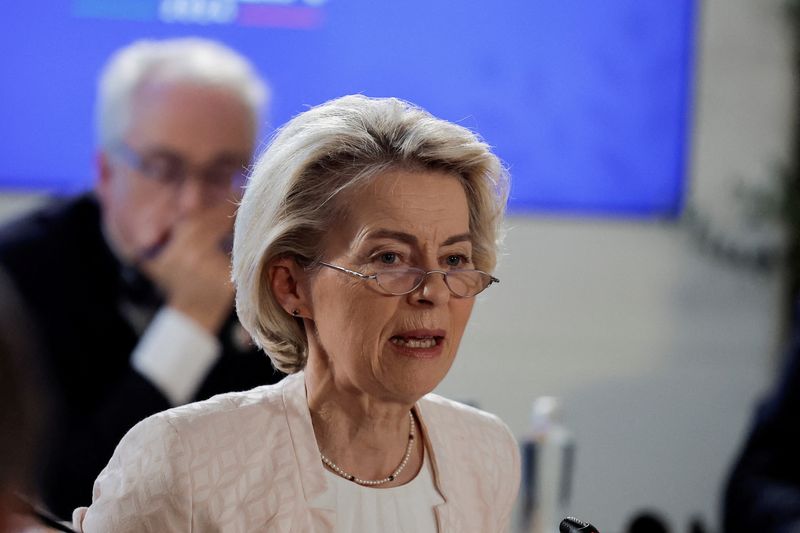
By Andrew Gray and Jan Strupczewski
BRUSSELS (Reuters) - European Union leaders ended a discussion on who should take the bloc's top jobs for the next five years without agreement on Monday, aiming instead for a decision at a summit next week.
The leaders' meeting was the first since the European Parliament election, which saw gains for the centre-right and right-wing nationalists, but humiliating defeats for French President Emmanuel Macron and German Chancellor Olaf Scholz.
Over dinner in Brussels, the EU's 27 national leaders discussed who should run the powerful European Commission executive body, who should chair their European Council meetings and who should take the post of foreign policy chief.
They had been widely expected to nominate Ursula von der Leyen of Germany for a second term as European Commission chief, Portuguese ex-premier Antonio Costa as Council president and Estonian Prime Minister Kaja Kallas as top diplomat.
But the current European Council president, Charles Michel, said they needed more time.
"It was a good conversation, (it) goes in the right direction, I think. But there is no agreement tonight," he told reporters after the dinner.
Michel said pan-European political parties had made proposals about the posts and more work would be needed to reach an agreement. He did not elaborate on the proposals.
POLE POSITION
Von der Leyen remains in pole position to stay on as European Commission president, buoyed by gains in the June 6-9 elections for her centre-right European People's Party.
Thirteen of the 27 EU leaders are from parties belonging to the EPP. With French and German support too, she would have the qualified majority she requires to be nominated.
France had previously weighed alternatives to von der Leyen, but with a snap parliamentary election called by Macron from June 30, the government now prefers EU stability. Germany has made clear it backs von der Leyen for another term.
A trio of von der Leyen, Costa - a veteran socialist - and liberal Kallas would ensure a political and geographical balance among the top posts.
The leaders are due to make a formal decision at a summit on June 27-28. Von der Leyen would still then need backing from the European Parliament, which votes in its first session from July 16.
The full 27-member Commission, including the foreign policy chief, also needs parliamentary support.
The leaders also discussed the next five-year legislative cycle, with a stress on common values, defence and economic competitiveness. They are due to confirm their "strategic agenda" guidance at the end-June summit.
The leaders should shortly have a report by Mario Draghi, former Italian premier and president of the European Central Bank, on boosting the EU's economic prospects. In a speech on Friday, he said the bloc needed cheaper energy and a capital markets union to steer private savings towards investment.
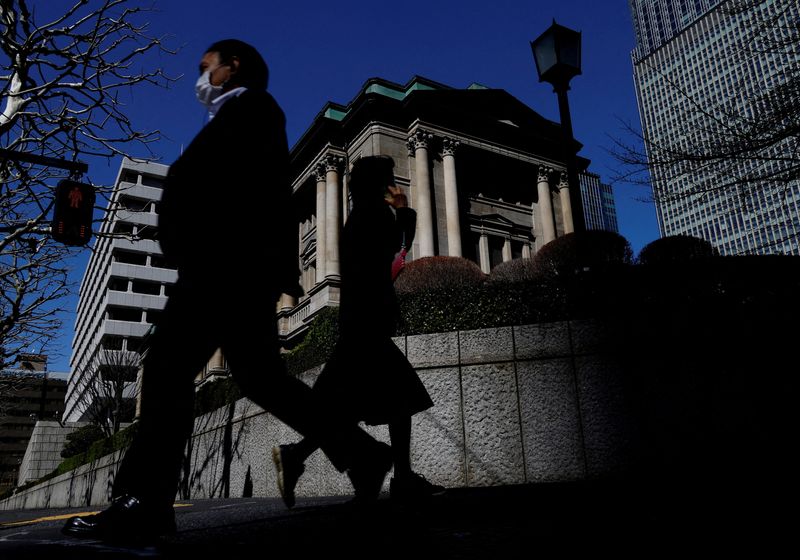
By Leika Kihara and Takahiko Wada
TOKYO (Reuters) -The Bank of Japan is likely to trim bond buying by around 24 trillion yen ($152 billion) annually in new guidance due next month, but forgo raising interest rates at least until September, former board member Makoto Sakurai said on Monday.
At its policy meeting on Friday, the BOJ decided to start trimming its huge bond purchases and announce a detailed plan in July on reducing its nearly $5 trillion balance sheet, taking another step toward unwinding its massive monetary stimulus.
Governor Kazuo Ueda gave few clues on how much the BOJ will actually trim its bond buying, saying only that the taper size will be significant.
"The BOJ has the option of reducing its monthly purchase amount by just one trillion yen. But with the governor having said the size would be 'significant,' there's a good chance it will taper by around 2 trillion yen," Sakurai told Reuters in an interview.
The BOJ currently buys roughly 6 trillion yen of government bonds per month with an allowance of 5-7 trillion yen. It will likely trim the purchase to 4 trillion yen per month, he said.
The BOJ's decision to announce its bond-tapering plan at its next meeting in July 30-31 has heightened uncertainty on whether it will hike short-term interest rates at the same meeting, or hold off until later in the year to avoid upending markets.
Sakurai, who retains close ties with incumbent policymakers, said the BOJ will likely forgo raising rates in July and wait for more clarity on whether summer bonus payments and wage gains will help consumption will rebound.

